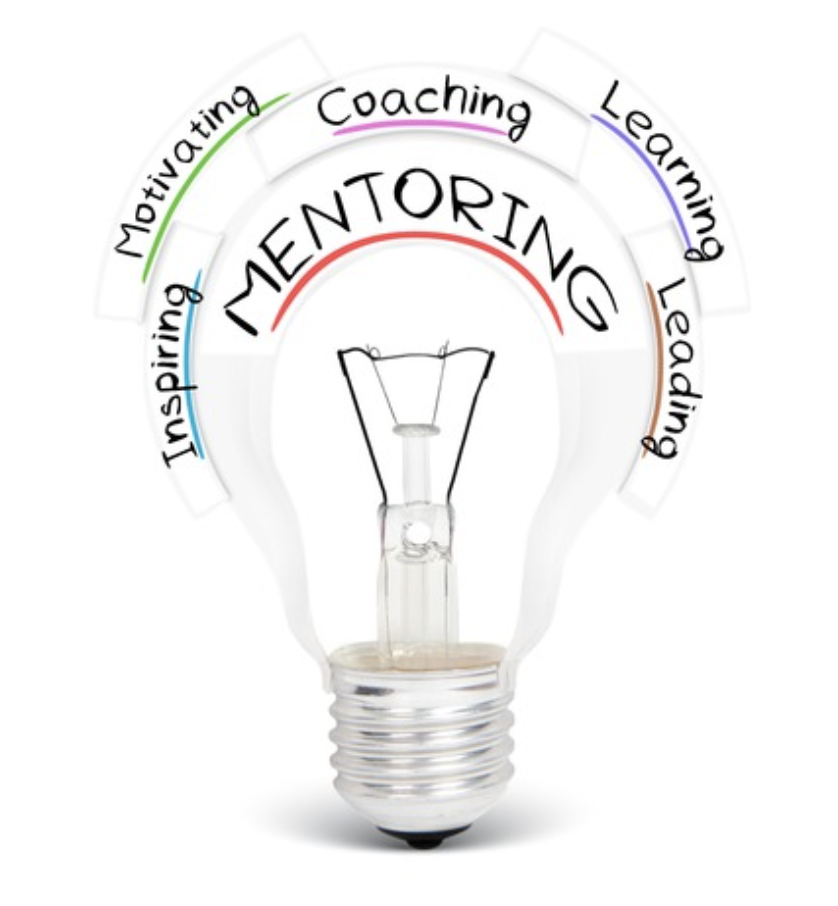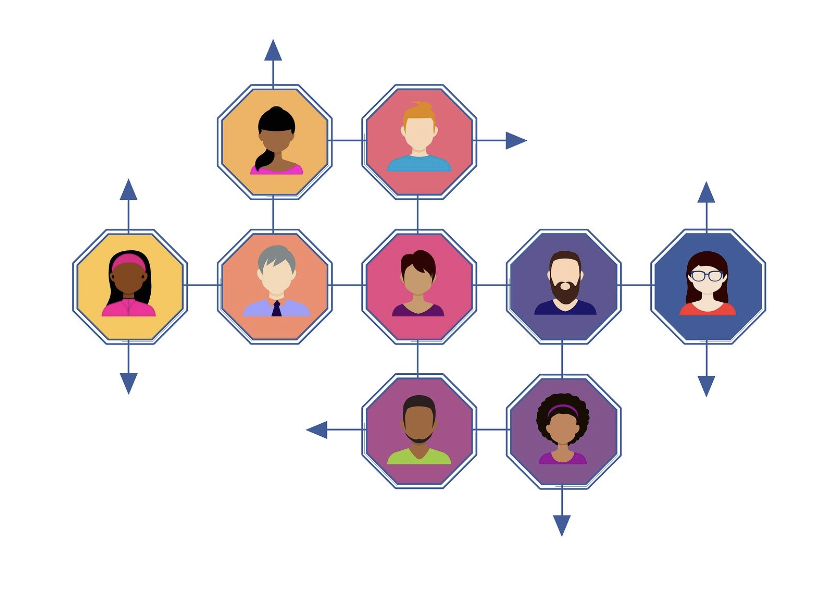Mentoring is any form of social learning where someone with more experience (a mentor) helps guide the learning and growth of someone with less experience (a mentee). There are common, but completely understandable confusions on what mentoring is, how it differs from other types of learning engagements, why it matters, and how to even get started by either finding a mentor or launching a mentoring program.
If you’re beginning your journey through mentoring, you’re in luck! This page is a hub for mentoring and will lead you right to other important topics on both the purpose of mentoring and the unique approach to learning that exists within mentoring relationships and programs.
🔥NEW🔥: MentorcliQ’s exciting new digital book, The Mentoring Movement, is here! Inspired by millions of hours of mentoring relationships and numerous stories from mentors and mentees at Fortune 500 companies using MentorcliQ’s software, this story is narratively delivered and interactive story takes you into the eyes of the employee and helps define what mentoring is and why it has such an outsized impact the employee experience. CliQ over now to start reading!
What Is Mentoring: Mentoring Defined in Simple Terms
The best way to define mentoring is that it’s a 1-to-1 engagement between a learner (the mentee) and a more experienced individual (the mentor) who shares knowledge and guidance around a specific need. However, even as we say that that’s the “best” way to define it, note that a 1-to-1 engagement is the most common but not the only way to structure a mentoring relationship. You can find more on that below in the section on “Mentoring Formats”.
Let’s visualize what mentoring might look like for you here with the following scenario:
When someone is starting a business for the first time, they may seek the advice of a more experienced business owner as a mentor who can help them navigate the often difficult trials and errors that are associated with entrepreneurship. That individual, the experienced business owner, is in a “been there, done that, bought the t-shirt” position. Meanwhile, the new business owner will have a million questions and need guidance to make it through what will likely be some challenging times ahead.
That, in essence, is the very nature of mentoring. When someone wants to grow and succeed in an area, they’ll seek help. Social learning through mentoring is one of those avenues for help.
Mentoring Definition
Mentoring occurs when an experienced person advises and guides someone with less experience. Within a business context, the practice of assigning a junior member of staff to the care of a more experienced person who assists them in their career development.
Mentoring is more than just guidance; it’s about building personal and professional growth through shared knowledge and experiences. Understanding mentoring means recognizing its role in career development, building professional networks, and enhancing leadership skills. It’s a powerful tool, not just for the mentee but for the mentor too, as often, mentorships create mutual learning and development environments.
What Is a Mentor?
A mentor is a guide and role model. It’s someone who provides professional growth, career advancement, and personal development insights. Within a mentoring relationship, mentors may be the driver at times, and the passenger at other times. The level of leadership in the relationship will depend on what the mentee needs at different times. Typically, mentors offer their support, knowledge, and leadership skills to help others achieve their full potential.
What Is a Mentee?
A mentee is a person engaged in personal and professional development through mentoring. They seek guidance, career advancement, and skill enhancement from experienced mentors, to achieve their career goals and achieve personal growth.
What Is the Purpose of Mentoring?
The purpose of mentoring is to grow and learn. For a mentee, growth and learning are self-directed with guidance from a mentor. For the mentor, the purpose of mentoring is to be that guide and to give back to others the experience they’ve gained in the mentee’s growth area.
As basic and trite as that might sound, it’s actually refreshing to know that mentoring has a very focused purpose.
🙌 Take It With You 🙌
Download our Workforce Survival Guide to Learn how Mentoring can Boost Employee Retention
You’ll find that people don’t often start their personal growth journey by looking for a mentor. Usually, they begin by searching for educational content like written guides, courses, videos, and podcasts that explain more about that topic and try to answer their questions. That type of learning is typically what we call static learning.
With static learning, the individual is simply absorbing information in short bursts. These are treated like “one and done” learning engagements.
Conversely, mentoring would fall more under a dynamic learning model with an emphasis on experiential learning. This type of model, among other things, emphasizes interpersonal connection and moves beyond the “sit and watch” to a more performative model.
👉 KEEP READING: What Is the Purpose of Mentoring?
A dynamic social learning approach is a winning one

In the case of mentoring, the mentee is the one taking ownership of their own learning, while the mentor digs deep into their cache of experience to help guide the mentee in the right direction. There is simply no replacement for experiential and self-driven learning. In fact, in studies of college students where experiential learning was applied, students who had less experience in a subject area performed 15-30% better on post-exams.
Of course, you may not be a college student. You might be invested in learning about mentoring at an enterprise level. We’ll posit here that the same applies, especially within mentoring relationships. When mentees are able to take control of their learning, get their hands dirty so to speak, and experiment with the right guardrails and guidance put up by a mentor, their growth will soar.
From a business perspective, mentoring is also highly desired by employees. Deloitte found that Millennial workers were more likely to stay at their current organization if they had a mentor. And CNBC found that 90% of workers who had a mentor were happy at work. Workplace happiness is directly tied to better performance, better skill development, better engagement, and better retention.
Why Is Mentoring Important?
Mentoring bridges knowledge gaps and encourages professional development. It’s the framework for developing and growing personally and professionally. Through mentoring, both mentors and mentees gain insights, helping create individual and organizational growth.
When to Use Mentoring?
Mentoring is useful at different stages of your professional journey. Here are some opportunities where seeking a mentor could make a significant difference to your development:
- Early Career: For foundational skill building and understanding industry norms.
- Career Transitions: To navigate you through new roles or sectors with confidence.
- Leadership Aspirations: When targeting leadership roles and needing to develop specific skills.
- Skill Enhancement: For specific technical or soft skill development.
- Work-Life Balance: Effectively managing professional responsibilities alongside your personal life
- Networking: To expand professional networks and understand industry dynamics.
Mentoring Techniques
To get the most out of mentoring, several useful techniques can be used. Each technique is designed to optimize your learning and development. Knowing and using each technique when it is appropriate will smoothing your development process:
- Active Listening: Ensuring you understand and have empathy for your mentee or mentor helps everyone stay on the same page and continue being effective.
- Goal Setting: Establishing clear, achievable objectives that are linked to timeframes (REAL goals are good for this).
- Feedback: Providing constructive, actionable insights. for your mentor or mentee to build from.
- Modeling: Demonstrating desirable behaviors and practices, becoming a role model for mentees to look up to.
- Encouragement: Boosting confidence and motivation. An important factor for performance is employee morale and confidence. Encouraging mentees will help them develop professionally.
- Networking: Build connections within professional circles and providing support in a social group. Using formal mentoring programs, peer mentoring, and e mentoring strategies to accomplish this.
- Skill Development: Provide guidance and focus on specific areas for growth to overcome challenges and boost career growth.
Mentoring vs Coaching and Mentoring vs Sponsorship
We’ve been talking about mentoring programs for nearly 20 years now, but we know not everyone has been as focused on it as we have been. There’s often some confusion on what exactly constitutes mentoring, how mentoring differs from coaching, the types of mentors you may find, and how to create an effective mentoring program relationship.
To answer your top-level question here: Are mentoring, coaching, and sponsoring different?
Yes, but that doesn’t mean they can’t all happen in sync. In fact, what you’ll likely find is that each of these types of learning engagements all falls under the same umbrella, and work together within a social learning relationship.
In her book on mentoring, Mentoring Programs that Work, MentorcliQ’s Director of Learning and Development, Jenn Labin, breaks down the key differences this way:
- Mentoring: an experienced individual offering guidance and support.
- Coaching: involves utilizing a set of skills to facilitate growth and development, often through active listening and asking questions to encourage problem-solving.
Here’s the thing: there’s no expectation that a coach is necessarily more experienced in an area, although they usually are. And within a mentoring relationship, you can get coached. That doesn’t make the mentor a coach necessarily. So it’s best to look at mentoring as a type of learning relationship and coaching as a type of teaching style or practice.
And, of course, we can’t forget sponsorship. We can define sponsorship this way:
- Sponsor: An individual who provides support, guidance, and advocacy for a colleague, typically in their career development and advancement.
Especially in the workplace, a sponsor is going to be someone who heavily promotes the idea of you to leaders who may be able to boost your career advancement.
Note this important fact: Mentors are not always sponsors. Many mentoring relationships never transform into sponsorships. Ideally, they will. But there should not be an expectation that they do.
There’s effectively no limitation on how a mentoring program or relationship can operate. As long as it meets the objective of connecting individuals into meaningful, learning-focused interactions that are consistently mentee-driven, it’s at least structured in a way that is likely to be successful. Still, there are distinctions between coaching, mentoring, and advising
People often talk about mentors as their coaches, guides, teachers, advocates, and advisors. They sometimes use these terms interchangeably with “mentor” because it helps give a fuller picture of all the roles a mentor can play for a mentee.
At the end of the day, we suggest you don’t get too hung up on the terminology (call it whatever makes the most sense to you), but we do suggest that you focus on the outcomes you hope to gain through a mentoring program.
In fact, a former colleague of mine, Randy Emelo, has spent the past two decades sharing how mentoring can occur in different ways: information-based, skill-based, and advocacy-based. You may find that one of these categories or a combination of these categories helps clarify what you want to achieve with mentoring.
How Does Mentoring Differ From Coaching?
Mentoring focuses on growing both personally and professionally over the long term. By building a supportive, developmental relationship between mentor and mentee. Coaching, however, is more task oriented, aimed at improving specific skills or achieving particular goals in a shorter time frame. The mentor offers guidance, sharing experiences for broader development, while a coach targets performance in specific areas.
Information-based mentoring relationship

With this type of mentoring relationship, mentees simply need information or understanding about a particular aspect of their work life. Mentors share their experiences and any techniques that they think will meet the mentees’ immediate needs. The mentor performs three basic functions through informational mentoring:
- Resourcing: The mentor provides information based on the mentee’s needs.
- Advising: The mentor becomes a reliable living source of instruction by giving advice.
- Enlightening: The mentor illustrates and brings understanding to the mentee based on the mentee’s needs.
Skill-based mentoring With this type of mentoring, mentees need to develop a specific skill. Over 40% of organizations are currently experiencing skills gaps. Many are turning to internal training and mentoring to help close those gaps with reskilling and other development. Mentors make themselves available to handle questions, consult on techniques, point out potential difficulties, set expectations, and report on how they have done it in the past.
The mentor performs three basic functions through a skills-based mentoring program:
- Teaching: The mentor instructs their mentee in specific skill development through on-the-job methods.
- Coaching: The mentor provides first-hand feedback on their mentee’s current performance.
- Modeling: The mentor serves as a living example for their mentee in a specific area of skill development.
Advocacy-based mentoring
With this type of mentoring, mentees need to focus on highly complex interpersonal behaviors. Mentors, although never taking responsibility for mentees’ future successes, become a guiding influence, helping mentees develop the most effective behaviors for various situations.
Mentors will assess what abilities mentees possess and help them plan appropriate learning and development activities. Mentors also observe and provide feedback on the mentees’ performance. The mentor performs three basic functions through advocacy-based mentoring:
- Guiding: The mentor navigates the mentee through the personal development process
- Consulting: The mentor becomes a sounding board and guides the mentee while they develop a specific behavior or ability
- Sponsoring: The mentor advocates the mentee’s recognition and promotion
Trust is the confidence both you and your mentoring partner need in each other’s character, ability, strength, maturity, and truthfulness in the relationship. Mentoring relationships are a mutual process. Trust has to be evident to both of you for the relationship to be productive.
Accountability is the fuel that drives any effective mentoring relationship. It encourages you to plan deliberately, to keep agreements, and to honestly assess your actions and attitudes. This level of honesty can keep your learning relationship-focused and serious. Moreover, accountability supports commitment. If a lack of honest commitment exists, then there will be fewer interactions between the mentee and mentor than are required to produce fruitful results from the relationship.
Types of Mentoring Relationships
As far as mentoring formats, there are several that we commonly see and help establish programmatically. These include (but are not limited to):
- 1-to-1 mentoring: Mentoring relationships between one mentor and one mentee.
- Group mentoring: Mentoring engagements between one mentor and multiple mentees
- Affinity groups/circles: Mentoring groups built around different affinities, such as Women’s Networks, Veterans’ Networks, or DEI groups.
The need for talent development predates the Great Resignation (or Great Reprioritization, as some are calling it). But this emerging issue, whatever term you may want to use to describe it, underscores the need for organizations to find creative ways to engage, connect, attract, and develop their teams. Consequently, mentoring is one of the best options to solve multiple issues underlying employee turnover and organizational growth.
Mentoring programs are also exceptionally common with onboarding, where new hires are paired with more experienced team members who help them get acclimated to organizational standards, culture, and processes.
From a high level, a mentoring relationship is about helping someone develop toward certain goals or objectives. The mentor primarily serves as a sounding board for the mentee, offering guidance and direction but not dictating the goal. This is why mentoring is typically unique from other types of learning engagements.
👉 KEEP READING: 7 Types of Mentors
Mentor-Mentee Pairing
Mentor-mentee pairing is important in mentoring. By focusing on aligning mentors and mentees based on goals, skills, and development needs. This ensures both parties benefit from the relationship regarding career advancement and personal growth.
What is Reverse Mentoring?
Reverse Mentoring flips traditional roles around, with younger employees guiding more experienced ones, often in areas like technology and current trends. This innovative approach boosts your organizational growth and bridges generational gaps, enriching the professional development of both mentors and mentees.
What Does a Mentee Do?
A mentee’s job is to learn and grow. That simple responsibility makes being a mentee a fun experience, as long as you have a good mentor to work with you. As a mentee, you can grow in all of the ways you want with the added bonus of having someone more experienced than you helping to guide you in the right direction.
Within a mentoring relationship, mentees are often (but not always, depending on the type of mentoring program) typically responsible for the following responsibilities:
- Creating a vision statement
- Setting personal goals
- Organizing meetings
- Actively listening during meetings with your mentor
- Putting your mentors’ advice into practice
- Reflecting on actions you’ve taken (both wins and losses)
Obviously, there’s more to being a mentee than that. But at the highest level, your biggest responsibility as a mentee is to be present and to actively work to progress along your goals.
What Does a Mentor Do?
Mentors leverage their experience to help guide a mentee toward personal and professional development. The only real requirement to be a mentor is to have a successful experience that can be used to help someone else grow. However, in structured mentoring programs, there may be additional requirements for who can be a mentor, such as their tenure in an organization, number of years of experience, their location, and their job function.
When you break out the mentor’s responsibilities, they’re similar to that of a mentee. The mentor’s core responsibilities include.
- Active listening
- Role modeling
- Providing encouragement and support
- Maintaining confidentiality
- Offering only as much guidance as is needed
That last point is one we’ll reiterate here. Earlier, we talked about the difference between static and dynamic learning. We emphasized that dynamic learning was a better, hands-on approach. Mentors need to apply this as much as possible. Mentees don’t learn by listening to your experience. They learn by putting ideas into practice, and having you dig into your experience to help them refine their approach, correct course when they’re wrong, and expand their idea of what’s possible.
A mentor’s most important responsibility is to lean into their experience in a way that helps their mentee achieve that mentee’s goals or objectives. What that looks like will vary widely on the parameters set by both mentors and mentees at the start of a relationship.
Mentors should consider creating a mentoring agreement at the start of a mentoring relationship. Mentoring agreements establish the roles and limitations of both parties. They spell out exactly how much or how little the mentor is responsible for, and vice versa.
What Are Good Goals for Mentoring Programs and Mentoring Relationships?
Whether you call it mentoring, coaching, sponsorship, information-gathering, or some other term, ultimately, the labels don’t matter. At the end of the day, the important thing is that you are engaged in the practice. And good engagement with mentoring requires effective goals.
What you do in your mentoring relationship will vary depending on the needs of the mentee or the purpose of the program, or both. No two mentoring relationships will look the same. That being the case, there’s no such thing as a “good” or “bad” mentoring goal.

Instead, think of your mentoring goals using the following questions:
- What mentoring goals align with my personal or professional objectives?
- What mentoring goals align with the needs of my organization?
- What personal or professional goals do I have that are achievable through a mentoring relationship?
- What personal or professional goals do I have that can be achieved with my current mentor?
- Will I need multiple mentors with different skill sets and experiences to achieve my goals?
None of these questions is about any specific goal that you should be working on in a mentoring relationship. Again, that’s going to be unique to the individual mentee, or to the organization and the overall goals behind its sponsored mentoring program. That said, you can make your goals (whatever they may be) more achievable by setting what we call the REAL development goals format. REAL goals are ones that are:
- Relevant
- Aspirational
- Experimental
- Learning-based
As long as your goals are REAL and align with what you and/or your organization needs, they’re far more likely to fall within the realm of what most people would consider being “good”.
👉 KEEP READING: 9 Clear Benefits of Mentoring
Here’s How to Find a Mentor
Herein lies the biggest challenge of all. Finding a mentor can be difficult in any situation, but especially if you’re not currently part of an organization or group where structured mentoring programs are offered.
To find a mentor as an individual, you can consider the following steps:
- Reaching out to a friend or family member who has the experience you want to gain
- Reaching out to someone in your social networks, such as LinkedIn. (If you’re just starting to build a LinkedIn profile, your network will probably be limited. Tools like LinkedHelper.com could help you expand it, or you could do some long hours going group-by-group and profile-by-profile to find like-minded individuals to add to your network.)
- Using a free or paid 3rd party mentoring service that connects professionals to mentor networks
If you’re looking for a professional or career mentor, there’s a good chance you can find one within your organization. If that’s the case, consider doing the following to find a mentor:
- Ask about existing mentoring programs and join one
- Join one of your company’s employee resource groups (ERGs) and seek a mentor through there
- Ask a peer or senior leader who has more experience to be your mentor
You’ll often find people who do have experience are happy to share it. They’re also often flattered that you would think highly enough of them to ask them to be your mentor. As long as they’re able to push past some feelings of imposter syndrome, they’re more likely than not willing to step up and do what it takes to be the kind of mentor you need them to be.
Keep this in mind: Anyone can be a mentor!
Although mentoring is often seen as an exclusive position for more senior members of an organization, the truth is that anyone within a company can be a mentor. This is why Reverse Mentoring programs are increasingly popular, especially for companies trying to solve critical diversity, equity, and inclusion problems.
👉 KEEP READING: 3 Ideas for Empowering Women to Find Mentors
The Benefits of Mentoring
Mentoring has many benefits. It directly helps your development as a professional and expands your network to advance your career. Additionally, unknown and valuable insights can come from both the mentor and mentee, which are crucial for growing your business and individual success.
How Can I Mentor Others?
To mentor others, focus on active listening, understanding their goals, and providing tailored guidance. Share your experiences and insights to aid their personal and professional development. It’s about building a supportive relationship.
Potential opportunities for mentoring others can be found in various settings:
- Workplace: Offering guidance to new or junior employees.
- Professional Associations: Mentoring within industry-specific groups.
- Educational Institutions: Supporting students or young professionals.
- Community Organizations: Volunteer to mentor in local community programs.
- Online Platforms: Participate in virtual mentoring programs or forums.
How to Start a Mentoring Program
Starting a mentoring program may be necessary if you want to help grow yourself and those around you, especially in a business or enterprise setting.
To start a mentoring program, plan out these first initial steps:
- Do some internal research to determine if mentoring programs already exist
- Conduct internal surveys to determine what type of mentoring programs are needed or wanted
- Identify several key business objectives that would be positively impacted by a mentoring program
- Explore the cost of launching and managing a program, including administrative costs and the cost of mentoring software
- Create a proposed program structure that includes program goals, projected number of participants, program length, and matching methods
- Find data that will help executive leaders understand the value of mentoring (we have plenty of data you can use on our mentoring stats page!)
- Present your proposal to executive leaders.
👉 KEEP READING: How to Start a Mentoring Program
One of the keys to good mentoring is in the matching process. When mentors and mentees are appropriately matched and effectively aligned, the mentoring relationship and the mentoring program as a whole see incredible results. Relying on a traditional pen-and-paper matching process is not only tedious but also limits the number of individuals that can be matched within a program.
MentorcliQ’s mentoring software offers an industry-leading matching solution that pairs mentors and mentees based on personality surveys. Contact us today to learn how we can help you can go from zero (mentoring programs) to hero (of the day because you helped create amazing programs and save your company millions in the process).




